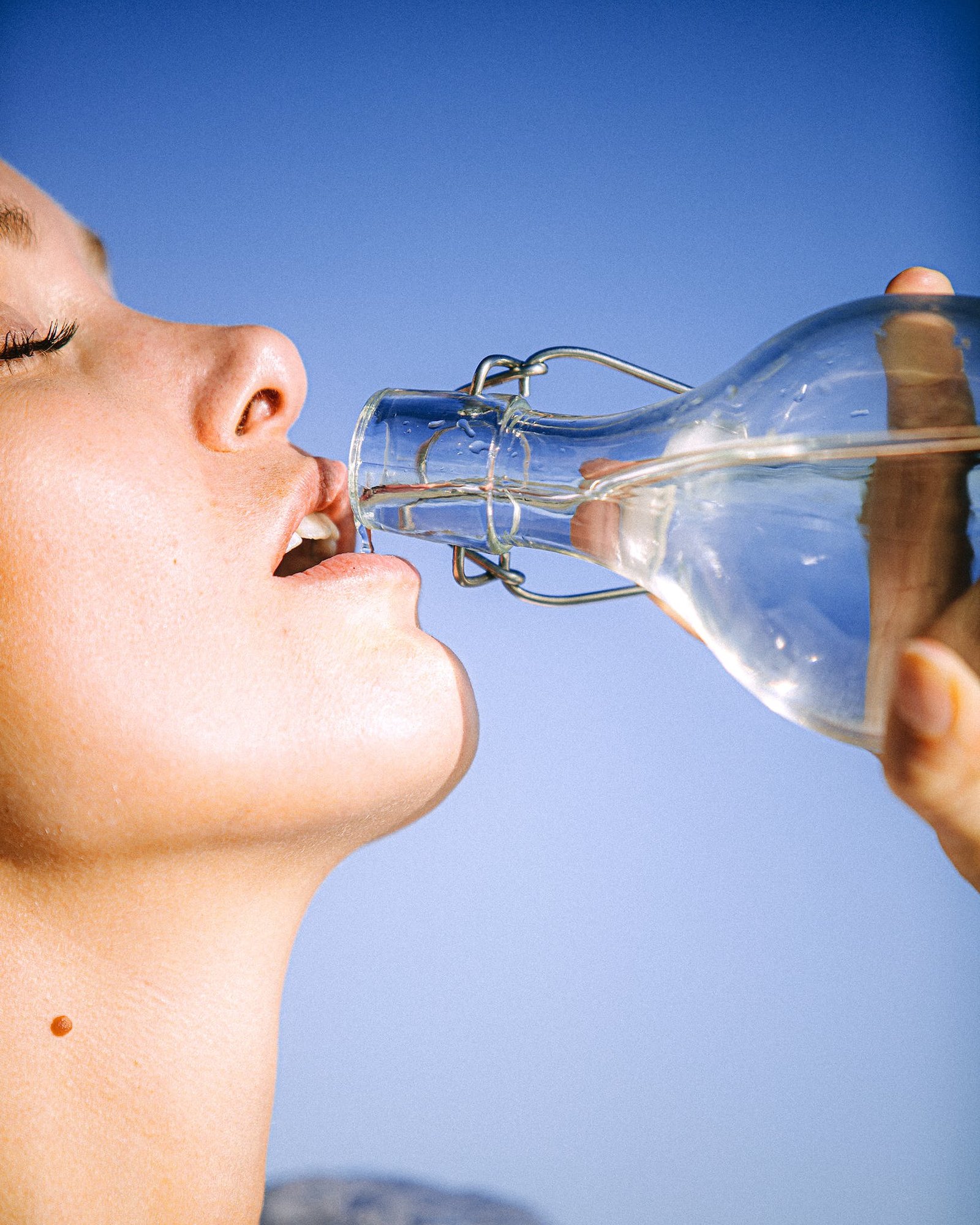Risk Factors for Dehydration in Young and Old
There are some affiliate links below, but they are all products I highly recommend. For more info, view my disclosure here.
Do you know the risk factors for dehydration in both the young and the old? It’s important to be aware of the potential dangers.
Age-related physiological changes, high temperatures, intense physical activity, inadequate fluid intake, certain medical conditions, diarrhea and vomiting, and limited access to clean drinking water can all contribute to dehydration.
Stay informed to protect yourself and your loved ones.
Age-Related Physiological Changes
As you age, your body undergoes physiological changes that can increase your risk for dehydration. One of these changes is a decrease in the total body water content. As you get older, your body tends to have less water, which means you’ve less fluid available to meet your daily hydration needs. Additionally, your kidneys may not be as efficient in conserving water as they once were, leading to increased water loss through urine. This can further contribute to dehydration.
Another age-related change is a decrease in the sensation of thirst. As you grow older, you may not feel as thirsty as you used to, even when your body needs fluids. This can lead to a decreased desire to drink and result in inadequate hydration. Furthermore, certain medications commonly used by older adults, such as diuretics or medications for high blood pressure, can increase urine output and contribute to dehydration.
Moreover, as you age, your body’s ability to regulate temperature may become less efficient. This can make you more susceptible to heat-related illnesses, such as heat exhaustion or heat stroke, which can lead to dehydration. It’s important to be mindful of your body’s fluid needs and ensure that you’re drinking enough water throughout the day, especially during hot weather or physical activity.
High Ambient Temperature and Humidity
You may experience higher levels of dehydration in hot and humid environments. When you’re exposed to high ambient temperatures and humidity, your body loses water through sweat at a faster rate. This increased fluid loss can lead to dehydration if you don’t adequately replenish the lost fluids. The combination of heat and humidity makes it more difficult for your body to cool itself down through sweating, which can further contribute to dehydration.
In hot and humid environments, you may not realize how much you’re sweating because the sweat evaporates quickly due to the high humidity. This can deceive you into thinking that you aren’t losing as much fluid as you actually are. As a result, you may not feel as thirsty and may not drink enough water to compensate for the fluid loss.
To prevent dehydration in hot and humid environments, it’s important to stay hydrated by drinking plenty of water throughout the day. Additionally, you can consider consuming electrolyte-rich beverages or consuming foods with high water content, such as fruits and vegetables. It’s also advisable to avoid excessive physical exertion during the hottest parts of the day and to seek shade or air-conditioned environments when possible.
Intense Physical Activity or Exercise
During intense physical activity or exercise, your body temperature rises and you start to sweat more. This increase in body temperature is a natural response to help cool down your body and maintain its core temperature. As you engage in vigorous exercise, your muscles generate heat, causing your body temperature to rise. In order to prevent overheating, your body activates its cooling mechanism, which involves sweating.
Sweating is your body’s way of regulating its temperature by releasing moisture onto your skin. As the sweat evaporates, it cools down your skin and removes excess heat from your body. This process helps to prevent overheating and maintain a stable body temperature.
However, during intense physical activity or exercise, you may lose significant amounts of fluid through sweat, leading to dehydration if you don’t replenish the lost fluids. Dehydration occurs when your body loses more fluids than it takes in. This can result in a range of symptoms, including dizziness, fatigue, muscle cramps, and decreased performance.
To prevent dehydration during intense physical activity, it’s important to stay properly hydrated by drinking enough fluids before, during, and after exercise. Water is the best choice for hydration, but sports drinks can also be beneficial, especially for prolonged exercise or when exercising in hot and humid conditions. Remember to listen to your body’s signals and drink when you feel thirsty to ensure you stay properly hydrated during intense physical activity or exercise.
Inadequate Fluid Intake
Not drinking enough fluids can lead to inadequate hydration during intense physical activity or exercise. When you don’t consume enough fluids, your body doesn’t have the necessary amount of water to function properly. This can result in decreased performance, muscle cramps, and even heat exhaustion or heat stroke. It’s important to remember that water is essential for your body to regulate its temperature and transport nutrients to your muscles. Therefore, it’s crucial to drink enough fluids before, during, and after your workout.
To ensure that you stay properly hydrated, it’s recommended to drink fluids consistently throughout the day. During exercise, aim to drink about 7 to 10 ounces of water every 10 to 20 minutes. However, this may vary depending on factors such as the intensity of your activity, the weather, and your individual needs. Pay attention to your body’s signals and drink when you feel thirsty.
In addition to water, you can also consider consuming sports drinks that contain electrolytes. These drinks help replenish the minerals lost through sweat and can be beneficial for longer, more intense workouts. However, be mindful of the sugar content in these drinks, as excessive consumption can lead to other health issues.
Certain Medical Conditions and Medications
Certain medical conditions and medications can affect your body’s ability to retain water, leading to an increased risk of dehydration. If you’ve conditions like diabetes, kidney disease, or adrenal gland disorders, your body may have difficulty regulating fluid balance. These conditions can cause excessive urination or increased sweating, both of which can deplete your body’s water stores. Additionally, certain medications, such as diuretics, antihistamines, and laxatives, can also contribute to dehydration by increasing urine production or causing excessive fluid loss through bowel movements.
It is important to be aware of these risk factors and take appropriate measures to prevent dehydration. If you’ve any of these medical conditions or are taking medications that may increase your risk, make sure to drink plenty of fluids throughout the day. Aim for at least eight glasses of water daily and increase your intake during hot weather or physical activity. It may also be helpful to monitor your urine color – if it’s dark yellow, you’re likely not drinking enough water and should increase your intake.
In addition to staying hydrated, it’s important to consult with your healthcare provider to manage your medical conditions effectively. They can provide guidance on how to prevent dehydration and may recommend adjustments to your medication or treatment plan if necessary. By staying vigilant and taking proactive steps, you can reduce your risk of dehydration and maintain optimal health.
Diarrhea and Vomiting
If you experience diarrhea and vomiting, it’s important to replenish your body’s fluids to prevent dehydration. Your body loses a significant amount of water and electrolytes when you have diarrhea and vomiting. This can lead to dehydration, which can be dangerous if left untreated.
To prevent dehydration, you need to drink plenty of fluids. Water is a good choice, but you can also try drinking clear broths, sports drinks, or oral rehydration solutions. It’s important to avoid drinks that contain caffeine or alcohol, as they can actually dehydrate you further.
Sipping small amounts of fluids frequently throughout the day is better than trying to drink large amounts at once. If you’re having trouble keeping fluids down, you can try sucking on ice chips or popsicles to help stay hydrated.
In addition to drinking fluids, you should also try to eat small, bland meals to help replenish your body’s nutrients.
If your symptoms persist or worsen, it’s important to seek medical attention as soon as possible.
Limited Access to Clean Drinking Water
Limited access to clean drinking water can pose a significant challenge in maintaining proper hydration. When you don’t have access to clean water, it becomes difficult to stay properly hydrated throughout the day. Your body relies on water to function properly, and without enough of it, you can experience symptoms of dehydration such as fatigue, dizziness, and dry mouth.
In many parts of the world, clean drinking water isn’t readily available. You may have to walk long distances or wait in line for hours just to get a small amount of water. This can be especially challenging for those who are young or elderly, as they may not have the same strength or mobility to access clean water sources.
Furthermore, limited access to clean water can also lead to the consumption of unsafe or contaminated water. This can increase the risk of waterborne diseases and further contribute to dehydration. It’s crucial to prioritize finding clean water sources and taking necessary precautions to ensure that the water you consume is safe.
In order to combat this issue, it’s important to support initiatives that aim to provide clean drinking water to communities in need. This can involve investing in infrastructure for water purification and distribution, as well as implementing education programs on water hygiene and sanitation practices.







